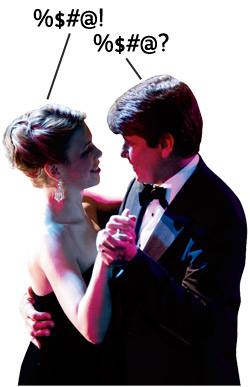 |
In January the Chicago Christian Industrial League fired Patti Blagojevich, the governor’s wife, from her job as the homeless shelter’s development director. One reason cited by her bosses: distracting headlines.
The state’s First Lady, of course, made headlines after snippets of her foulmouthed remarks were captured on wiretap transcripts as part of the federal corruption case against her husband. “Hold up that [expletive] Cubs [expletive]—[expletive] ’em,” Patti Blagojevich was heard saying on the tape, referring to an alleged plot to get Chicago Tribune editorial writers fired in exchange for the governor’s support for the sale of Wrigley Field to the state.
Patti Blagojevich’s salty language came as a surprise to some. One State Journal-Register columnist wrote that some of her friends were appalled: “Can you believe her language?” said one. “And she has kids at home.” The Daily Herald noted that the profanity caught on tape “certainly isn’t typical of what’s expected to come out of the mouths of First Ladies.” Even Barbara Walters piled on, calling her a “potty mouth.”
But why were people more taken aback by Patti Blagojevich’s foul language than by her husband’s? The governor dropped plenty of f-bombs of his own, according to the 76-page criminal complaint.
Deborah Tannen, a linguistics professor at Georgetown University who wrote the bestseller You Just Don’t Understand: Women and Men in Conversation (Harper; 2001), says that when it comes to swearing, there’s a clear double standard. “Men can use profanity and it’s not noticed as much,” she says. ”For women it’s considered more inappropriate, so it jumps out and is viewed negatively.”
Tannen adds, “People immediately think of women as mothers, no matter the context.” In the case of the Blagojeviches, she wonders, “Why aren’t people asking what kind of father the governor is?”
According to Timothy Jay, the author of Cursing in America (John Benjamins; 2000), swearing can be a show of strength. “It’s about power,” says Jay. “As women gain more power, they start to use the language of power.”
Jay explains that women began using more obscenities when they moved beyond their traditional roles of housewives. When Rosie the Riveter sent them to work in factories during World War II, women started talking like factory workers. The women’s lib movement of the sixties and seventies extended the notion of gender equality to swearing: If men can swear, dammit, so can women.
Yet, when it comes to cussing, men and women aren’t at all equal. “Men are still seen as assertive when they swear,” Jay says. “Women are viewed as losing control.”
A 2006 Associated Press-Ipsos poll found that women don’t swear as often as men, but that profanity bothers women more. Fifty-four percent of men admitted to swearing a few times a week, compared with just 34 percent of women, and 60 percent of men said they were bothered by cussing, with the number rising to 74 percent for women.
Photograph: Chicago Tribune photo by Jose More


